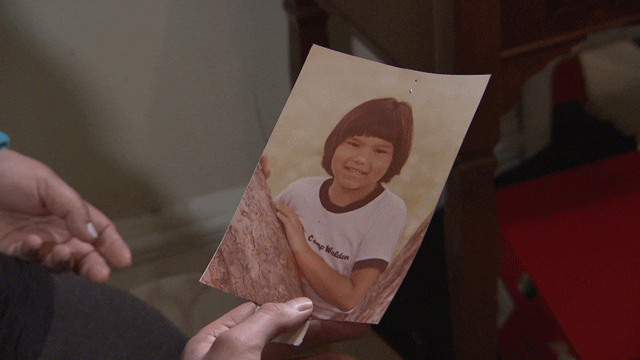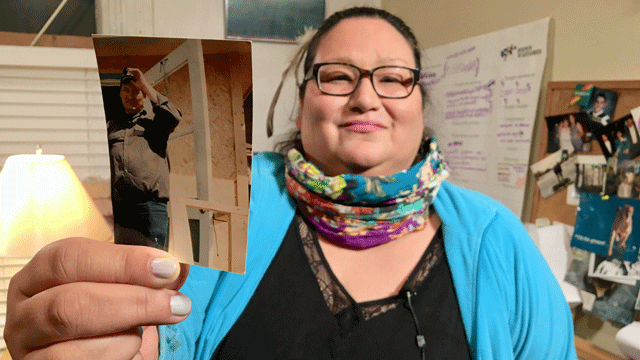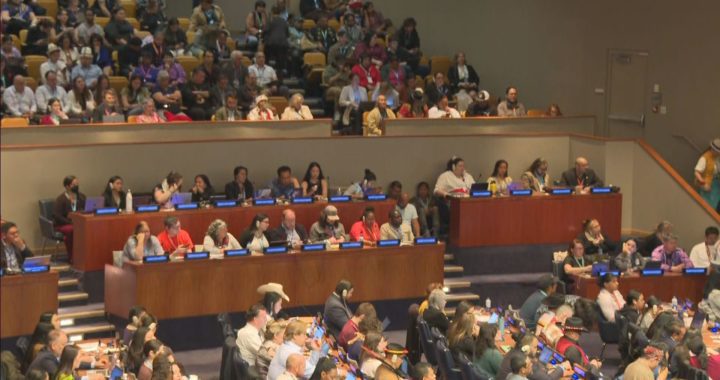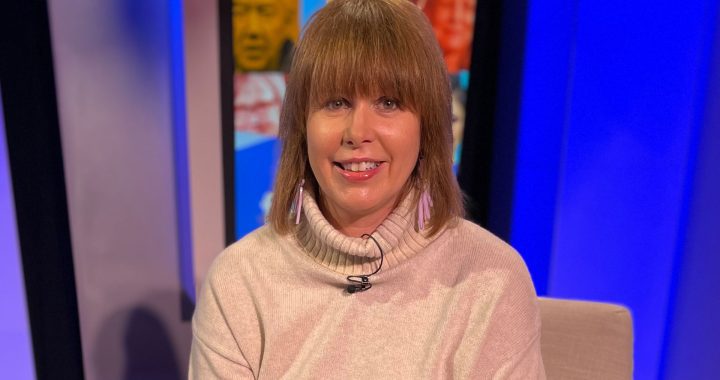60s Scoop survivor Trina Slapcoff reaches up to a makeshift cinderblock shelf in her living room and pulls down an old shoebox.
“I meant to fix this,” says the 49 year old, fussing with the box.
“it’s getting all squashed.”
The first thing she sees once the lid comes off is a picture of her when she was six. In the posed photo for her summer camp she’s smiling, literally hugging a tree.
For most, a childhood photo like this would invoke waves of nostalgia.

(Slapcoff when she was six years old at summer camp.)
But 43 years after this picture was taken, it’s not so easy for Slapcoff.
“When I was adopted I remember being very angry as a child,” she says. “I guess everybody, where I came from everybody looked Cree and spoke Cree, but when I came here everybody was white and spoke English or French.”
In the early 1970s, Slapcoff was scooped from her family in The Pas, Manitoba when she was only a year and a half old.
She said her birth father came back from a hunting trip to find that she had been taken from her grandparents.
“My native dad said that he used to say my name, to give me strength, because he knew that it was probably really hard for me,” Slapcoff says.
“He didn’t know where I was.”
Although Slapcoff now has a good relationship with her biological father’s side of the family, she says growing up nearly 3,000 kilometres away in Montreal left her feeling isolated, like “a stranger in her own skin.”
“There was nobody there, you know, to help me,” says Slapcoff through tears.
She describes her adopted family as stable and well meaning, but ignorant with regards to Indigenous culture and not always understanding of what she was going through.
Slapcoff is one of an estimated 20,000 Indigenous people scooped as children by government policies that encouraged their apprehension. They were placed in mostly white middle class families.
Dubbed the “60s Scoop”, this practice actually occurred from the late 1950s to the early 1980s.
Many scoop survivors have struggled with similar psychological pain that Slapcoff describes, and are also distressed by the loss of their Indigenous culture.

(Slapcoff holds up a picture of her biological father.)
As a result. Canada agreed to a settlement worth $850 million.
At a recent information session in Montreal organized to help survivors learn more about the settlement process, about dozen people mill about on a lunch break. Several different First Nations are represented amongst the scoop survivors here.
Mélanie Vincent is in charge of this series of cross country info sessions on behalf of Collectiva, the law firm taking care of the settlement.
The Huron-Wendat woman emphasized that it’s free for people to apply.
“What is very important is that in case of any doubt, if you’re not sure about your eligibility, if you’re not sure about your Indian status eligibility, you can file a claim, even though it’s not a complete form, Collectiva is there to help you out and find that information,” says Vincent.
She also said that all necessary forms can be filled out online or a person can help people in need over the phone.
Also attending the class settlement information session was Tealey Ka’senni;saks Normandin. Normandin is also a 60s scoop survivor, but said on this day she was attending in her role as an outreach worker.
Although she calls the application process simple, the Mohawk woman says she has clients that are eligible but in danger of falling through the cracks before the August 30, 2019 deadline.
“Dealing with an application, dealing with an information session, it seems to be overwhelming,” she says.
“Coming here today, I want to make sure I get the information, so I’m clear and precise so I can visit them at home bring them the applications talk to them and most importantly be the support that they need.”
Slapcoff also attended the information session and intends to apply, even though she feels the estimated $25,000 to $50,000 dollars she could receive is insufficient.
“The class action suit is not giving enough money for people who have suffered this much, you know, because when I was a little kid I remembered I wanted to kill myself,” Slapcoff said, her voice tinged with anger.
Slapcoff says she no longer has thoughts of suicide, and has taken steps to surround herself with a support system.
But there are other struggles.
While she has a degree in community economic development, she is currently unemployed. She said a large portion of whatever money she might get will go to pay debt.
Money will help these things – but whether or not she will ever be able to open a shoebox full of photos without emotional turmoil will remain a part of her healing journey.
If you would like to know more about the 60’s Scoop Settlement process, go here: https://sixtiesscoopsettlement.info/Main.htm or call 1-844-287-4270.










Trina’s story mirrors mine in many ways … stolen and sent two thousand kilometers away to a different and, seemingly, foreign land. Just know that you’re not alone. We’re survivors.
They stole us from our families
Trina’s story mirrors mine in many ways … stolen and sent two thousand kilometers away to a different and, seemingly, foreign land. Just know that you’re not alone. We’re survivors.
The hardest part in this telling the story about the Adults who had two faces. One for you and the other for the authorities. I’m pretty grounded but the story is hard to tell but I know I am stronger than the perps.
Having an identity taken appears to be quite easy, finding ones way back is even harder. Not to worry because the calling is still there.
They stole us from our families
The hardest part in this telling the story about the Adults who had two faces. One for you and the other for the authorities. I’m pretty grounded but the story is hard to tell but I know I am stronger than the perps.
Having an identity taken appears to be quite easy, finding ones way back is even harder. Not to worry because the calling is still there.
Does this go for Indian status too ,cause we where put in a foster care on the same reserve, but was very brutal for us and being raped and child abuse teal bad beaten up by the foster care who should be looking after us but didnt st all just made fun of my parents calling them down lots of was said about them . rape child abuse, verbal and so on .
Applying was traumatic for me. It took 3 tries at the paperwork, I was so triggered emotionally. My unresolved frustration is that it wasn’t even acknowledged surviving as many as 18-19 foster-care placements in addition to 1 failed adoption placement before being ‘permanently’ adopted twice. My adoptive Mom was told (when I was first ‘offered’ to her) that I had been in so many foster placements, that I was expected to be high-needs due to so many disruptions, yet conveniently, the gov’t has lost that info. I have been depressed all my life, even suicidal as early as 10 yrs old, yet I didn’t even know what that was, just that I didn’t want to live due to abuses that taught me that I didn’t like to suffer. I still take antidepressants (& have tried almost every anti-anxiety & antidepressant ever invented) when needed, and attended supportive counselling on & off for about 3 decades. No amount of money will make me better or replace my potential that was taken from me. I would have loved to have a stable career or education to avoid (semi?) poverty, but had developmental ‘disorders’ (from trauma) that made it difficult to learn to read or pay attention. I returned to school many times to make an ‘honest effort’. Many of my ‘peers’ from support groups & similar-background adult friendships have died prematurely, while struggling through their similar horrors. Their suffering, (as mine,) was unnecessary, yet they will never get acknowledged by this and that breaks my heart.
In addition, both of my real parents were dead when the government finally released my personal information to me, so for me, honestly; this ‘settlement’ money is sort of just an insult, especially when the general population doesn’t get it and complains about their precious freakin tax money still…
Does this go for Indian status too ,cause we where put in a foster care on the same reserve, but was very brutal for us and being raped and child abuse teal bad beaten up by the foster care who should be looking after us but didnt st all just made fun of my parents calling them down lots of was said about them . rape child abuse, verbal and so on .
Applying was traumatic for me. It took 3 tries at the paperwork, I was so triggered emotionally. My unresolved frustration is that it wasn’t even acknowledged surviving as many as 18-19 foster-care placements in addition to 1 failed adoption placement before being ‘permanently’ adopted twice. My adoptive Mom was told (when I was first ‘offered’ to her) that I had been in so many foster placements, that I was expected to be high-needs due to so many disruptions, yet conveniently, the gov’t has lost that info. I have been depressed all my life, even suicidal as early as 10 yrs old, yet I didn’t even know what that was, just that I didn’t want to live due to abuses that taught me that I didn’t like to suffer. I still take antidepressants (& have tried almost every anti-anxiety & antidepressant ever invented) when needed, and attended supportive counselling on & off for about 3 decades. No amount of money will make me better or replace my potential that was taken from me. I would have loved to have a stable career or education to avoid (semi?) poverty, but had developmental ‘disorders’ (from trauma) that made it difficult to learn to read or pay attention. I returned to school many times to make an ‘honest effort’. Many of my ‘peers’ from support groups & similar-background adult friendships have died prematurely, while struggling through their similar horrors. Their suffering, (as mine,) was unnecessary, yet they will never get acknowledged by this and that breaks my heart.
In addition, both of my real parents were dead when the government finally released my personal information to me, so for me, honestly; this ‘settlement’ money is sort of just an insult, especially when the general population doesn’t get it and complains about their precious freakin tax money still…
We’ve come though our lives thus far, through beauty, through tribulations, and we’re still surviving! Stay strong.
Try this link
https://sixtiesscoopsettlement.info/Main.htm
We’ve come though our lives thus far, through beauty, through tribulations, and we’re still surviving! Stay strong.
Try this link
https://sixtiesscoopsettlement.info/Main.htm